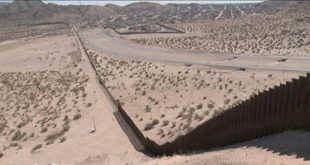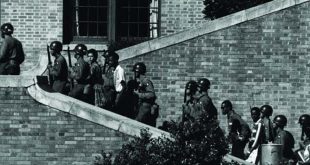The road from Doboj to Sarajevo winds along the Bosna River through bucolic farmland and then miles of barren landscape destroyed by strip coal mines. I was driving through Bosnia and Herzegovina after that country’s civil war. I was defending a war criminal and interviewing victims in that three sided – Orthodox, Muslim, Catholic – religious civil war.
The road’s ditches held the debris of war, a rusted military jeep, a burned out troop carrier, a blown up tank. As I rounded a curve in the road a tall white minaret behind a solid walled compound dominated the green valley. In the open square women in black hijabs were herding kids into what had to be a school. Armed men, many with beards and assorted headgear, were scattered among them. A read and white gate manned by sentries barred entry. The installation was devoid of identifying signs – there were no flags flying.
I turned to my driver, a local and asked “What the hell is this place?” The laconic answer was “That’s the leftover Mujahedeen who married locals and were ordered to stay and help the Muslims out.” That was my first and only first-hand experience of a foreign religious force in local politics.
I have had my fill of religious head-butting in politics. The last fifty years have been a confrontation between God’s followers and secularists here in the United States. Lawrence v Texas overturned Bowers [gay & lesbian rights]; Roe v Wade [abortion] was recently modified by Zubic [contraception]; the cases dealing with the display of religious symbols are too numerous to cite; and don’t forget the United States against both Lawrence and Windsor modified by Obergefell v Hodges [the unholy state of marriage].
If the present political campaign for president is an indication religious issues will continue to dominate the political landscape. The issues however are domestic and homegrown and have not been co-opted by foreign political interests, at least not as yet.
At best these dust-ups are results of domestic proselytizing – sometimes benign but virulent all the same. There is a new breed of missionary out there that is both religious and political. I first became aware of them while reading reports on madrassas, the all-male religious schools in Pakistan, back at the beginning of the never ending war in Afghanistan.
Reports had as many as 40,000 madrassas teaching over 2 million youths by 2008. Graduates spilled over into Afghanistan. The schools were funded by the Saudis and thought Sunni “Wahhabism as reflected in the education [of] students in Saudi Arabia”. One critic reported on the “intolerance in teachings” as in the daily chant of exhortation at a madrassa in Peshawar on the Afghanistan border: “When people deny our faith, ask them to convert and if they don’t, destroy them utterly.”
The West has a history of “robust”, “pro-active” proselytizing by Christian missionaries. Need I remind you of the fate of the locals in Mexico and Central and South America? But that was then, not now. Times, perceptions and standards of behavior have changed. Today you may not convert a people using the cross and a sword. Today, regime change for a religion’s sake is beyond the pale and is a crime against humanity to be prosecuted and punished.
That’s the “why” point of this article. The United Nations’ Universal Declaration of Human Rights Article 18 guarantees Saudi Arabia’s right to foster religious beliefs. The European Convention on Human Rights Article 9 also supports that right. Saudi Arabia’s support of its Islamic beliefs in Pakistan and elsewhere including Kosovo should not be prohibited or condemned unless it is contrary to internationally accepted norms.
Kosovo was once part of ex-Yugoslavia. A 1998-1999 ethnic conflict ended with a military intervention by NATO which resulted in a United Nations protectorate which with a different configuration continues to this day. Since 2008 Kosovo is either a constituent part of Serbia or a newly independent sovereign state depending on your point of view. It is a landlocked country on Europe’s fringe of 1.9 million souls – 92% of them Kosovo Albanian Muslims.
“Since then – much of that time under the watch of American officials – Saudi money and influence have transformed this once-tolerant Muslim society at the hem of Europe into a font of Islamic extremism and a pipeline for jihadists” according to a May 21, 2016 front page article in the New York Times concluding that is “a deliberate, long-term strategy by Saudi Arabia to reshape Islam in its image, not only in Kosovo but around the world.”
Saudi Arabia religious intervention in Kosovo is well documented by the Times article. There is no need for me to repeat the facts and findings – Saudi Arabia’s funding of the program, the construction of houses of worship, the threats, acts of intimidation and physical violence that have taken place are all there. You can read them for yourself and reach your own conclusions, see “How Kosovo was turned into Fertile Ground for ISIS” and learn “[h]ow Kosovo and the very nature of its society was fundamentally recast … [by] … a decade-long ambition by Saudi Arabia to spread its hard-line versions of Islam – heavily funded and systematically applied … with threats and intimidation…”
That’s the “why not” point of this article. Saudi Arabia has crossed the line by its actions in support of Islam in Kosovo and must be deterred from doing so in the future. Article 9 [2] of European Convention on Human Rights dictates religious freedom is subject “only to such limitations as are prescribed by law and are necessary in a democratic society in the interests of public safety, for the protection of public order, health or morals, or for the protection of the rights and freedoms of others.”
The present situation in Kosovo requires international bodies, the United Nations and the European Union, to address the issue and take appropriate action against Saudi Arabia.
 Deyan Ranko Brashich is a contributor writing from New York. He is the author of Letters from America, Contrary Views and Dispatches. His contact and blog “Contrary Views” is at www.deyanbrashich.com
Deyan Ranko Brashich is a contributor writing from New York. He is the author of Letters from America, Contrary Views and Dispatches. His contact and blog “Contrary Views” is at www.deyanbrashich.com
 Печат – Лист слободне Србије Политички недељник, актуелна политичка дешавања, друштво, свет, култура.
Печат – Лист слободне Србије Политички недељник, актуелна политичка дешавања, друштво, свет, култура.







